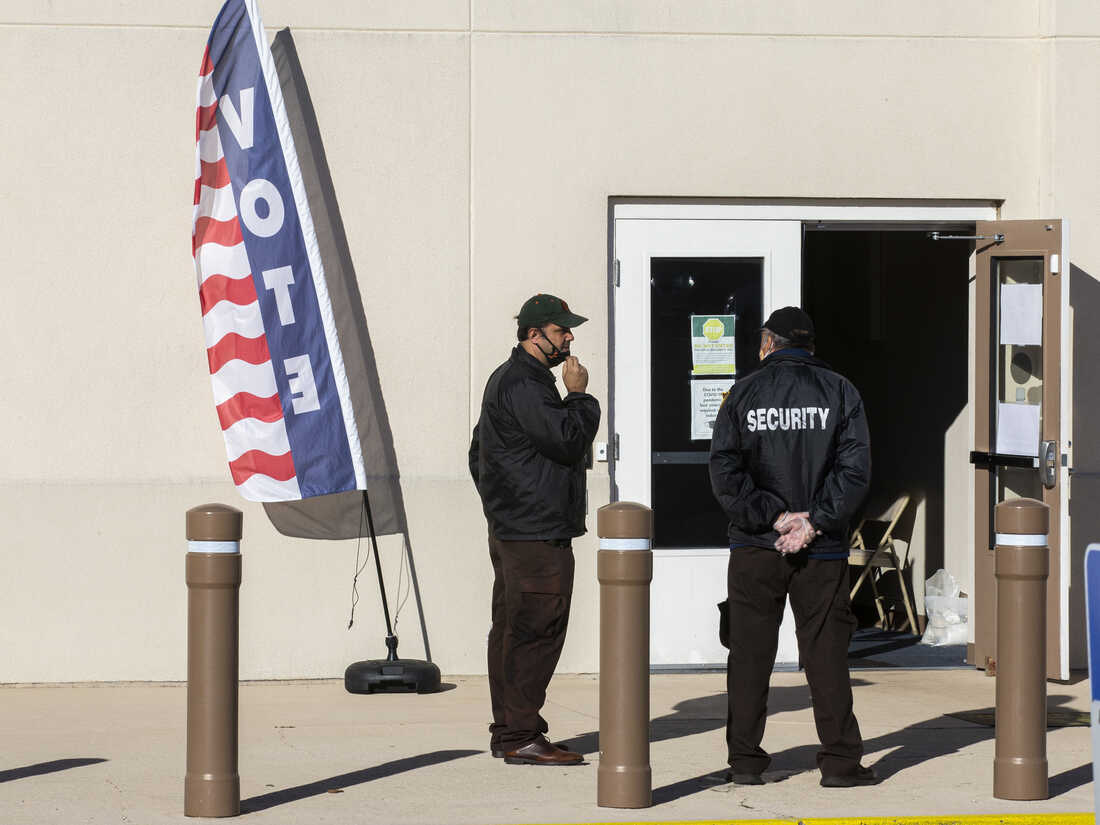
(Security personnel wait for voters outside the Leon County Supervisor of Election Office in Tallahassee, Fla)
US security agencies have issued an advisory warning people of potential attacks on political candidates, politicians, and other election officials. This comes right after the attack on House Speaker Nancy Pelosi's husband in their California home. The FBI, Homeland Security, and other agencies released a bulletin saying that more people will believe in election fraud because of the violence and that the risk of violence is due to increased extremism and ideological beliefs. These extremists attack specific election locations to "sway voting habits, undermine perceptions of the legitimacy of the voting process, or prompt a government reaction."
In addition, election officials and federal agencies are on alert for hackers trying to breach systems that support elections. For example, in the past month, two unidentified hackers sent phishing emails to members of an election board. Also, in the past month, the FBI has noticed that Russian and Chinese organizations have been promoting misinformation about the integrity of American elections. This has become more common in recent years because, since the 2016 election, many foreign governments have been trying to shape US public opinion on elections.
Since this is a huge issue and Russia, China, and Iran are all nations that have influenced elections, Jen Easterly, director of CISA, says that "it's so important that Americans realize that they need to build resilience against that ." In addition to the threats of violence and the information in the media, election officials have reached out to the CISA to do more to help them deal with this spread of misinformation and protect election officials. Easterly says that her agency will contact all state and local election officials who run and administer the elections to ensure they have the information they need to protect their voting system.
https://www.cbsnews.com/news/midterms-cisa-jen-easterly-election-infrastructure-face-the-nation/
https://www.npr.org/2022/10/29/1132537240/government-warns-domestic-attacks-midterm-elections
5 comments:
Everybody is on high alert because of the 2016 election. Misinformation on social media has proven to be incredibly dangerous and also has the potential to interfere with democracy. Elon Musk's twitter takeover now seems more concerning. With less content limits, it seems that misinformation/propaganda purposely spread from foreign countries on social media could do more damage.
It's interesting to see how the 2016 election is effecting election procedures now that it is 6 years later, and political polarization has gotten more relevant to the every day citizen and stronger since then. As to the cause of this, the media and misinformation definitely play a big role, but its also important to note the candidates and their following. People are now supporting candidates off of who/what they oppose rather than what they support, and it is interesting to see how this can escalate to physical threats and violence.
There has been a concerning development of misinformation beginning with the 2016 election and continuing through the election hoax campaigns after the 2020 election. The January 6th attack on the Capitol also seems like it may have been a significant turning point for the use of violence for politics, especially since the repercussions were not as severe as many expected and/or hoped for. The globalization of information and communication with social media, as Niki mentioned, and the internet in general is definitely showing a strong downside to modern technology with the rise of fanaticism and these inflammatory trends that seem to provoke more dramatic reactions from citizens than before. It will be interesting to see if this violence progresses, how government officials take steps and measures to tame the "flames" of internet culture.
Social Media has continued to allow misinformation to ripple through the American public. With the accessibility along with the sheer volume of users, the claims of "voter fraud" and "stolen elections" have platforms in which they can spread. Over the past twenty years, there has been an apparent decline of faith in our elections, while social media continues to become more influential. This correlation may explain why Donald Trump was able to rally various groups to back his claims of a stolen election in 2020. But in 2016, when President Trump won, some Americans claimed Russia interfered. Though American elections are extremely secure, the media/government is not making that clear to the public, leading to the instability highlighted by this post. If we want to limit the power nations like China and Russia have over American public opinion, the government and media need to build trust in their institutions.
With the rise of conspiracy-theories about topics such as voter fraud, the U.S. needs to be better secured against political violence. These conspiracy theories are often spread through social media, so social media should take more responsibility in fighting misinformation through putting disclaimers that not all information on their platforms is true and identifying and removing bots that spread misinformation. However, the government should also take action in the fight against misinformation through educating students on how to identify misinformation on social media and telling them that the best source of news is established news networks, not social media accounts. With these steps, misinformation will hopefully be reduced, thus decreasing the potential for political violence.
Post a Comment